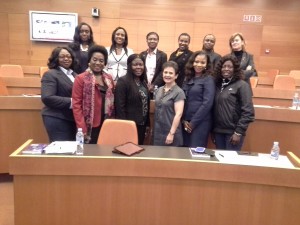This week I met a group of great women business leaders from West Africa. African women are a powerful driving force. At the same time, their social recognition is not always on a par with that force. I find this somewhat paradoxical.

African women have an important role to play on every level:
- some women are at the frontier of the political scene: this is the case of Ellen Johnson Sirl, President of Liberia since 2006, for example. She’s the first elected female head of an African state, and was awarded the 2011 Nobel Peace Prize.
- other women are at the helm of important companies: some are the entrepreneurs that have created these organizations, like Ibukun Awosika. A graduate from IESE’s Global EMBA program, Ibukun is the founder and chairperson of The Chair Centre, a market leader in the office furniture and banking security systems industries in Nigeria.
- most women are the ones holding their families together: I have seen women doing construction work in Nairobi. When I showed my surprise, it was explained to me that it’s not unusual for a man to turn to alcohol if he loses his job, and then women will do whatever it takes to bring up their children.
And yet, in many African countries women do not receive the recognition they are due:
- marriage brings women to a more respected status – they become someone’s wife and therefore gain the respect owed to him. When people find out a woman is unmarried, they might show disrespect for her. For instance, a female faculty member was teaching a class, and the students were treating her impolitely. At a certain point, she said: “I wonder what Mr. Her-last-name would think if he heard these things…” and they immediately began to retract their comments.
- when a woman becomes a widow, she loses her status, and may even lose her property to her in-laws depending on how greedy these are. One colleague explained to me that when one of her friends became a widow, she visited my colleague and asked her to keep the deeds to the house, as she was afraid the in-laws would come and claim them. While this may have to do with Africans’ communal mentality and there are various ways in which to interpret it, it’s an indicator of the status of women.
It’s about time that the recognition women receive is in line with their own dignity and with the great contributions they make to society. One way to help to bridge the gap is to share the wonderful stories about great women, as I have tried in to do in the first part of this post. Can you share any other great stories?


It seems very interesting that meeting you held with those African Women. Worldwide women still are not recognized as they deserve and in many countries they have to overpass many difficult situations. Some weeks ago I had the great opportunity to know Amin. One man who was one of those boys like many others from India living during some years in Bombay’s stations. His sister Sabira was only seven years old when she ran away from home with her brother due to the unbearable life with their parents. Sabira always had very hard life. Sabira means morning and few days after she was born got polio that affected her leg. After some years wandering was finally coming to protection shelter. Shelter was founded by the Jesuits, who ran it along with the Sisters of Charity of the order of St. Anne. At age 16, she was diagnosed with a painful form of arthritis, which resulted in long periods spent in hospital. However she still managed to finish high school, after which she enrolled in the Mother Vanni school of Nursing, in Andhra Pradesh. Despite the many hospitalizations, in 2010 she graduated as a nurse practitioner. She had some more health problems along her life that could get over with good treatments and her faith. She is nowadays 30 years old, Sabira is a nurse working with Médecins Sans Frontières who works with people with HIV / AIDS and tuberculosis, and her greatest desire is “to be like Mother Teresa to serve the sick with love and joy, the joy that comes from knowing that He first loved us.”
“LIFE IS LIFE. I AM BECAUSE OF YOU”
Amin Sheikh
Jose-Pedro, thanks for sharing this inspiring story. There are many people like Sabira who may go unnoticed but who make a great difference in the world, and I think we all need to know about them.